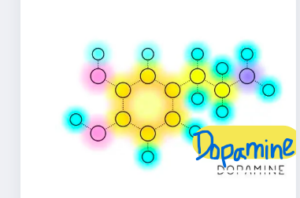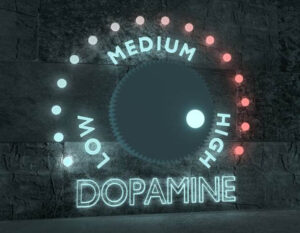
Swimming in a sea flowing with ongoing stimulation and distraction can be a recipe for dysfunction. Say even addiction? One more dopamine, please. In today’s modern world, the click of a button leads to immediate gratification. This is instant satisfaction now, on demand. From fast food, groceries, clothing, cars, and more, delivery options are endless. And growing. Streaming services, surfing the web, and scrolling social media make entertainment effortless. For hours. How can we make chilling on the couch without having to do anything even easier?
The amount of exertion required for us to do things that once took hours, days, or weeks is now near zero. Also, the number of ways our not-so-innocent cell phones seem to captivate and compel us is infinite. Don’t get me wrong, I love using my phone and it is pretty engaging from time to time and educating. Sometimes we need a break and getting lost in our phones can give us a sense of relief.
Yet I wonder, what is this mind manipulation doing to our souls, bodies, and lives? Are we overdriving and draining our brain’s response to pleasure to the point we are numb to what we love? Are we destroying our attention spans? Our ability to respond to discomfort and difficulty with resiliency? Are we avoiding things because at the time it feels better to get absorbed into our phones?
What might you ask is the secret culprit? The core factor influencing us being sucked into our phones. What is the need for constant stimulation and entertainment? This unspoken, once driver, for our survival as a species in the search for pleasure, is now abused in excess. Cue the marvels of modern technology. Meet your happy chemicals dopamine. This chemical is a major player in managing our movements, emotions, and cognition.
What is Dopamine?
Dopamine is an excitatory neurotransmitter. It plays a vital role in our brain functioning. Some of these functions include motivation, reward, movement control, and reinforcement learning. Dopamine helps regulate and incentivize our brain’s pleasure centers. It propels us to get things done and uplifts us when we achieve something or do something we love. Dopamine is also responsible for motor movement and control. Thus helping us move our bodies well.
What happens when there’s too much dopamine? Well, an excess of dopamine can lead to a condition known as dopamine addiction. This happens as the brain becomes reliant on the pleasurable effects of dopamine. It is often associated with certain substances like sugar, alcohol, and drugs. Or behaviors like shopping and mindless cell phone scrolling among many others. This can trigger compulsive and repetitive actions to ensure such enjoyable effects. The brain craves that dopamine rush again and again.
How Excessive Stimulation Triggers Dopamine Down Regulation
Now, let’s talk about dopamine receptors. These receptors are a type of protein that lives on the surface of cells in the brain. They receive and bind to dopamine molecules. Think of them as tiny sites waiting to receive signals or messages from dopamine. They are key for transmitting dopamine’s delightful effects and influencing various brain functions. Yet when dopamine signaling becomes excessive, this impairs receptor functioning. It decreases their sensitivity to dopamine and even decreases the number of receptors.

This so-called down regulation of dopamine receptors affects how the brain functions. It causes the brain to be less responsive to dopamine. This means it takes even more dopamine to feel even baseline pleasure. Hence, the addictive effects like yearning for more mindless scrolling, eating, or spending. What you have been doing to reach that enjoyable state isn’t cutting it anymore. As a result, your satisfaction wanes. Your brain is asking, “dopamine, can I have some more?”
So what to make of all this dopamine jargon? Whether you are having issues with regulating your dopamine or not life will mirror back to you. Symptoms of potential dopamine dysfunction include moodiness, anxiousness, lack of motivation, and insomnia. Likewise, difficulty concentrating, feeling unmotivated, tired, hopeless, and helpless are other signs. Sometimes these issues are indicative of an underlying physical or mental health condition. Regardless, your lifestyle choices and habits influence your dopamine functioning.
How to Be Mindful About Stimulating Dopamine
How then do you know if you are experiencing dopamine dysregulation to the point of it becoming an issue? You know yourself best. You will never know exactly how much dopamine you have without taking special tests. At the same time, you can reflect on the quality and direction of your life. Self-awareness and monitoring how you respond or react to life starts from within.
Are you using your cell phone in excess? Although relative to opinion, using something in excess is using it to a detriment. That is using something to the point of creating an undesirable outcome. Have you looked at the cost of lost opportunity? Losing time with those you love in person, hobbies, and traction with your goals can occur. It’s possible to take a break from life by scrolling and playing away on your phone without it being a problem. At the same time, it can be easy to overindulge. Being an effortless and consuming distraction for avoiding the stark realities of life.
Prioritize Values and Make Time for Them
How is your day-to-day mood? Do you find pleasure in activities you love? Like spending time with people, places, and beings you care about. Playing with puppies. Smelling the roses. Savoring a sunset. Rock climbing. Dancing to live music. Socializing. Painting. Walking in nature. Whatever it is that brings you joy and happiness, does it play a role in your life? Even if that includes scrolling social media, ordering takeout, or watching movies.
Some ways to promote healthy dopamine regulation include living with intention. Setting time limits on how often you use your phone and for how long. And when. Carving out chunks of time for things that are important to you and making them a priority is essential. Get what you need to get done first before you let yourself get carried away.
Putting Intention into Action
Establish parameters around your spending, eating, drinking, and phone usage habits. When you live by these parameters you create self-trust. This fosters a lifestyle of self-control and discipline. Thus making the things you enjoy feel like a guilt-free treat and celebration.

Cultivating habits that train, sustain, and nourish your attention and focus are key. Reading, gardening, and working with your hands are good ways to boost your dopamine. A healthy diet, regular exercise, and reduced stress contribute to balancing dopamine. Lowering your alcohol and sugar intake helps. Getting enough sleep every night consistently can be a game changer.
It’s no joke. Advances in modern technology offer convenience and instant entertainment. While this is undeniable, being mindful of how we use our phones influences our lifestyle is key. Along with other dopamine-driven lifestyle behaviors. Their potential to disrupt our lives and hijack our brain’s reward system is always there.
Finding a balance that allows us to enjoy their benefits without excess is crucial. And without sacrificing connection and personal growth. We can make choices that align with our values and long-term goals. This helps us navigate the sea of constant distraction. It also contributes to sustaining satisfaction in meaningful life experiences.
